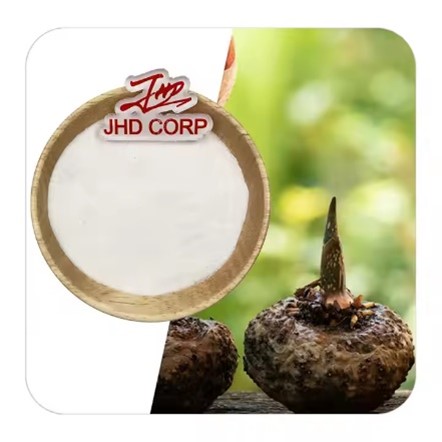Welcome to JHD Nutrasource!
Shop
Konjac Glucomannan
Konjac Glucomannan (KGM) is a natural dietary fiber derived from the tubers of the Amorphophallus konjac plant. It is a water-soluble polysaccharide composed of glucose and mannose units, known for its high viscosity, water absorption capacity, and gel-forming properties.
Description
Function
- Gel-Forming and Thickening: KGM can form thermally reversible gels and highly viscous solutions, making it an excellent thickening and gelling agent in food applications.
- Weight Management: Due to its high water absorption capacity, KGM can create a feeling of fullness, helping to control appetite and support weight loss.
- Digestive Health: As a soluble fiber, KGM helps regulate bowel movements, prevent constipation, and promote the growth of beneficial gut bacteria.
- Blood Sugar and Cholesterol Regulation: KGM has been shown to help lower blood glucose, cholesterol, and triglyceride levels, making it beneficial for managing diabetes and cardiovascular health.
- Prebiotic Effects: It serves as a fermentable substrate for intestinal microorganisms, contributing to the production of short-chain fatty acids and overall gut health.
- Antioxidant and Anti-inflammatory Properties: KGM has demonstrated antioxidant and anti-inflammatory activities, which may contribute to its health benefits.
- Biocompatibility and Biodegradability: KGM is non-toxic, biodegradable, and generally regarded as safe (GRAS) by regulatory bodies.
Application
- Food Industry: Widely used as a thickener, gelling agent, stabilizer, and emulsifier in products like noodles, tofu, jellies, and soups.
- Dietary Supplements: Used in weight management products and dietary supplements to support digestive health.
- Pharmaceuticals: Utilized in drug delivery systems and controlled-release formulations due to its gelling properties.
- Packaging: KGM is used to create biodegradable and edible packaging films, offering a sustainable alternative to traditional plastics.
- Agriculture: Applied as a coating for fruits and vegetables to extend their shelf life by reducing moisture loss and inhibiting microbial growth.
- Cosmetics: Used in skincare products for its moisturizing and film-forming properties.

